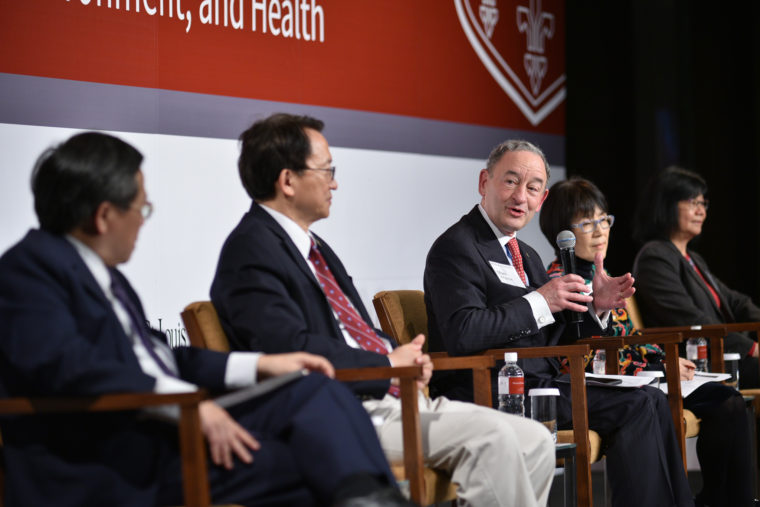Washington University in St. Louis’ commitment to finding collaborative, creative solutions for far-reaching global problems is deep and wide-reaching. Of particular concern is the environment, and making the necessary choices to ensure the air we breathe, the water we drink and the food we eat is safe, clean and healthy.
A group of Washington University leaders — including Chancellor Mark S. Wrighton — traveled to New Delhi Dec. 15, then to Taipei Jan. 18, to present daylong forums titled “How Energy Choices Affect Agriculture, the Environment, and Health.” The goal: engaging a variety of partners to advance solutions for the environmental challenges posed by energy choices.
“The forums — in both India and Greater China — enhanced the university’s leadership role in addressing one of the great challenges facing us: the effects of climate change on human health,” Wrighton said. “Both events allowed us the opportunity to meet directly with our global partners, corporate leaders and governmental officials as we all work toward solutions for this multifaceted and far-reaching issue.”
While energy choices and their consequences are indeed a global concern, their effects can be felt locally in different ways. In India, where a public health emergency was declared for much of the winter due to smog, air quality is of particular concern; in Taipei, a shift away from nuclear power and the ensuing ramifications was top of mind.
The forums allowed Washington University to interface with its McDonnell Academy partner universities from both India and throughout the Greater China region, zeroing in on each country’s individual challenges. It also brought corporate leaders and government officials together for a series of focused discussions tackling different challenges.
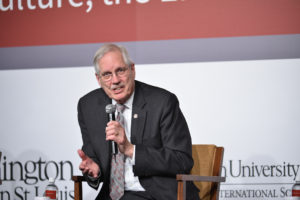
“With our 34 partner universities around the world, the McDonnell Academy provides a ready-made platform for organizing discussions on global challenges, such as the ones we had in Delhi at the Forum for India in December and in Taipei at the Forum for Greater China in January,” said James Wertsch, vice chancellor for international affairs and director of the McDonnell International Scholars Academy. “The academy was not originally founded with these two forums in mind, but the network we now have in place made it natural to pursue these conversations. These two annual events have added immensely to our efforts to bring Washington University’s strengths to bear on global issues.”
Three key university leaders — Pratim Biswas, assistant vice chancellor and chair of the Department of Energy, Environmental & Chemical Engineering at the School of Engineering & Applied Science; William Powderly, MD, the Larry J. Shapiro Director of the Institute for Public Health; and Barbara Schaal, dean of the faculty of Arts & Sciences — served as keynote speakers, then led panel discussions comprised to further examine specific problems and identify possible solutions.
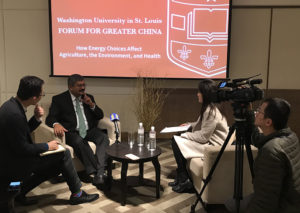
“The importance of the energy-environment nexus is and will remain an important topical issue,” Biswas said. “The energy portfolio of most nations will be from a mixed set of primary sources.”
Biswas pointed out many of those energy choices result in poorer air quality, and that advances in technology, such as artificial intelligence, big data and satellite monitoring, will be key to better understanding and mitigating the issue.
“A primary impact of energy source choices is on local air quality, specifically particulate matter,” said Biswas, speaking in India. “Advances in aerosol science and technology are important in both understanding air quality and developing approaches to resolve the adverse impacts.”
Those adverse impacts can, and often do, include negative consequences for public health, a topic addressed during Powderly’s keynote speeches and panel discussions.
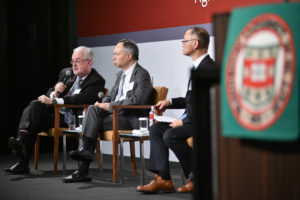
“The major impact of energy choices on health will be determined by the degree to which those choices affect air quality and climate change-induced warming of the planet,” Powderly said. “Much of public health thinking centers on prevention.
“Earlier energy choices may have moved us beyond primary prevention of these public health problems. Instead, we need to focus on adaptation and mitigation of anticipated problems so that informed energy choices can minimize health consequences for communities across the world,” Powderly said.
Climate change’s effect on weather patterns increasingly has a direct impact on agriculture yields, and many of the fertilizers used to grow crops can have a polluting impact on groundwater. These are just a few of the challenges the world will face as it seeks to provide enough food to support its people, and they were addressed during the forums.
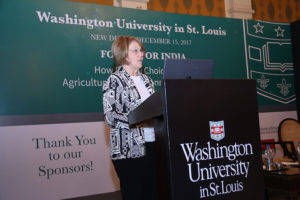
“As the human population grows, agricultural production needs to increase, providing ample harvests of nutritious food,” Schaal said. “Moreover, agriculture must participate in the bio-economy, providing new sources of energy, new products and new jobs.
“At the same time, there is a global movement to reduce the environmental effects of agriculture, reducing the use of agrochemicals and water,” Schaal said. “The expectation is that all of this will occur in the face of a changing climate. A combination of research, university and industry partnerships, and government policy can assure that we meet these challenges.”
Both events brought in faculty members and leaders from several of Washington University’s McDonnell International Scholars Academy partner institutions for further exploration of energy choice issues. The academy serves to strengthen ties between Washington University and leading universities around the world, allowing them to engage in educational approaches and research projects that advance our world.
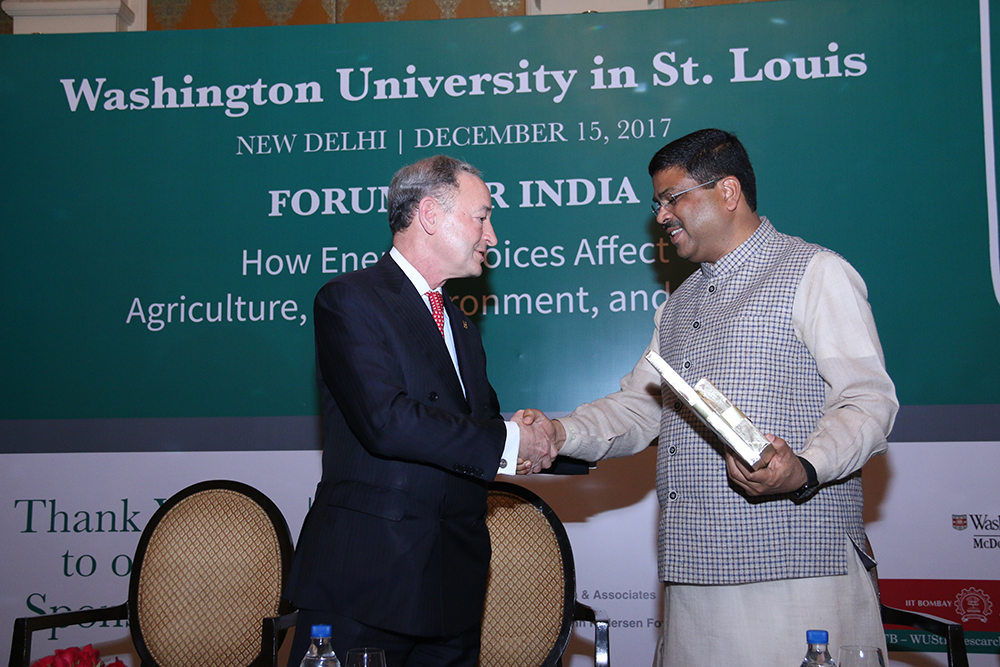
In addition to the keynote addresses and panel, Dharmendra Pradhan, India’s minister of petroleum and natural gas, gave remarks about his country’s current and future energy choices. Wrighton also inked an agreement with V. Ramgopal Rao, president of the Indian Institute of Technology Delhi, which became the 34th partner university to enter the McDonnell Academy. Rao explained the significance shortly after the signing.
“There’s an opportunity for us to reach out to international collaborators and work on global problems,” Rao said. “We have the best minds on these campuses, we also need to expose them to global challenges and work in teams to address these issues.”
Said Wrighton: “We see so many challenges ahead of us, and no single institution — and indeed no single country — can actually address all of the approaches to solving these big problems. So it’s important for us to partner with other institutions in other countries to solve global problems that face us all.”
